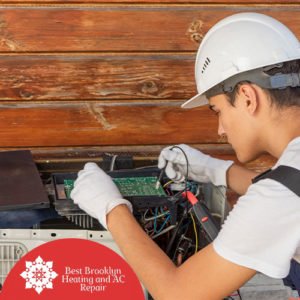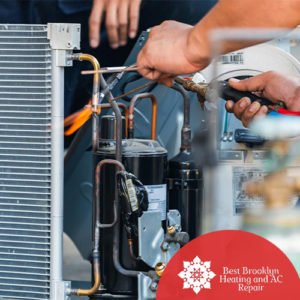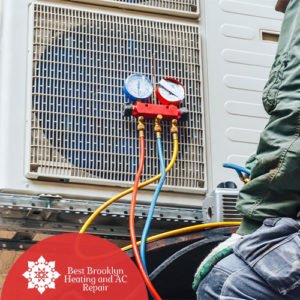 Air conditioning units are essential to reduce indoor heat strokes during the warmer summer months. It doesn’t matter which climate you live in because every part of the world still experiences heat during the summer. To be comfortable, you will need a working air conditioning unit to cool down the air temperature in your home. It is best to call on air conditioning services from Best Brooklyn Heating and AC Repair for consultation on the best AC type for your home.
Air conditioning units are essential to reduce indoor heat strokes during the warmer summer months. It doesn’t matter which climate you live in because every part of the world still experiences heat during the summer. To be comfortable, you will need a working air conditioning unit to cool down the air temperature in your home. It is best to call on air conditioning services from Best Brooklyn Heating and AC Repair for consultation on the best AC type for your home.
The cost of an entire air conditioning appliance can be broken down into its type, energy consumption, installation, and future maintenance costs.
Various Types of AC Units By Unit Cost and Installation Cost

- Central AC Units – This is the most common air conditioning unit in many residential homes. Depending on the unit’s size and the other factors stated above, the total average cost is between $2500 and $7000. This cost also includes AC installation.
- Window AC Unit – Though they have similar functions to central AC units, window AC units are intended only to cool one room they are placed in instead of the entire house. However, the good thing about these window-type units is that they are portable and easily transported. Installation is also rather unnecessary since its installation is pretty simple. They are the cheapest in the market and are sold based on the horsepower and the room’s square footage. They typically cost around $150 to $750.
- Ductless Mini-Split – If the home doesn’t have ductwork installed, mini-split AC units are the best choice for you. The total average of the ductless mini-split and its installation can be around $1500 to $1800.
- Geothermal – These units offer heating and cooling functions throughout the home via ground-sourced temperatures. This appliance may be one of the more expensive AC options since it requires digging trenches and piping. The total average of the purchase and installation of geothermal AC units goes from $13,000 to $36,000.
- Dual Fuel – Although they are very similar to central air conditioners, dual fuel units utilize heat pump technology to help lower the cost of your monthly utility bill. The cost depends on the size of the home. The unit’s average and installation costs are around $4000 to $8000.
Other Costs of Air Conditioners To Be Considered
- Size – The size of your home and the unit should be considered when canvassing for a new AC system. The appliance’s efficiency can also depend on its installed room size.
- Brand – Reading reviews from homemakers with a particular AC unit brand may also affect your decision on which AC type to get. As long as you feel like the homeowner is satisfied with the product, it is probably a good choice for you.
- Installation – Hiring a professional HVAC technician may be costly, but having your air conditioner installed properly can also save you from repair costs in the long run. Some air conditioning issues are actually due to poor installation of the appliance.
6 Factors to Consider During Installation of Your New AC System
Because you called on the air conditioning services of an HVAC technician from Best Brooklyn Heating and AC Repair, you may also want to consider how the installation service is broken down into the cost. The homeowner should be knowledgeable about the services they hired from a professional HVAC specialist to ensure that they get the right price for the specific service:
- Quality of Service – Is your HVAC technician certified? Are they open about background checks? Your HVAC technician should come on time to avoid delays during the installation process of the new AC system. They should also bring professional equipment with them upon doing the installation for your AC system.
- AC Sizing – If you measured your room before purchasing the AC unit, you don’t have to worry about this step during the installation. But for your added information, your AC unit should be the right size for the room it is being installed in. An AC unit too small will cost you a higher energy consumption because it has to run continuously. A unit too large may not be able to dehumidify the air properly.
- Ductwork Efficiency – Ensure the ductwork is still in good condition before installation. Inefficient ducts may leak cool air into the environment instead of being transported to other rooms in the building.
- Refrigerant Charge – The AC manufacturer specifies in the manual how much refrigerant the AC system needs. The HVAC contractor should properly check the refrigerant levels of the AC unit before turning it on. If the refrigerant level is quite low, it may cause the AC unit to overwork and raise the energy cost.
- Ensuring Air Quality – The appliance manufacturer also issues air quality specifications. Ask your HVAC contractor first to inspect the ductwork and filters of your home to see if it is a good match for your new HVAC system’s specified air quality.
- Ask About Your AC Unit’s Energy Consumption – Sometimes, when your monthly energy bill is higher than usual, it usually indicates a problem with your AC system. Ask your HVAC contractor what the expected energy consumption of your AC unit is so you have a benchmark to look out for whenever you think your AC system has malfunctioned and is overworking itself to drive up energy costs.
- Maintenance – The best way to ensure that your AC system is always in its best condition is by signing a contract with a professional HVAC company to handle your regular AC maintenance.
Need help finding the right air conditioning system for your home? Our licensed HVAC specialists at Best Brooklyn Heating and AC Repair can provide you with sound advice for the best AC type choice for your household.